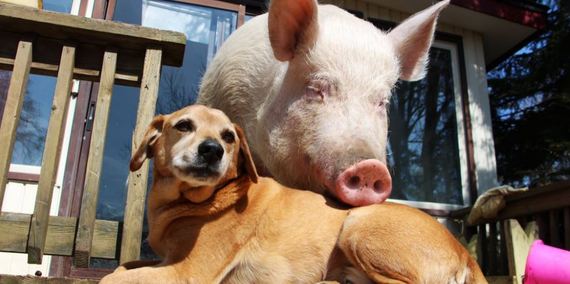It's back: Each year since 2010, crowds of people flock to the streets in a small Chinese province to celebrate at the Yulin Festival. As part of the festivities, an estimated 10,000 dogs are sent to the city - to be eaten.
The scenes are difficult to read about, let alone watch. These smart and social furry friends are overcrowded in cages and can barely even move. They're shipped long distances without food or water. Then they're yanked from their cages to face a gruesome death: their throats are cut and some may even be boiled alive.
As these graphic scenes emerge each year, outrage pours in from the Western world. Yet as important as it is to express horror at such violence that's taking place on the other side of the world, it's perhaps more challenging to examine our own customs with regard to animals here at home. While we may be horrified by the consumption of dogs in China, the way in which those are dogs are treated isn't far off from our own treatment of other animals raised and killed for food in the US - and we're killing animals in significantly greater numbers.
While 10,000 dogs will meet a gruesome death during the Yulin Festival this month, multiply that number by 100 and that's how many animals pass through American slaughter plants every hour of every day, experiencing fear and violence each step of the way.
Cows, pigs, and birds raised for food in the US endure misery-filled lives confined in facilities that look much more like factories than farms. And they're routinely treated in ways that would result in criminal prosecution if these same abuses were inflicted upon dogs or cats.
In our pork industry for example, most mother pigs are locked inside crates so small they can't even turn around--essentially for years on end. Treated like unfeeling piglet-producing machines, they're lined up like parked cars and forced to endure an unimaginable existence. Such extreme confinement and virtual immobilization takes an enormous physical and mental toll on these social, intelligent animals. Their muscles atrophy and eventually, many of them go mad, exhibiting behavior that unsurprisingly in humans would be diagnosed as clinical depression and learned helplessness.
The chickens we raise for meat aren't locked in cages, but they are prisoners of their own genetics, which have been manipulated by the poultry industry for abnormally rapid growth. Many birds have difficulty walking more than a few steps without collapsing under their obese bodies, causing chronic pain that renders them largely immobile. At just two months old, they're shipped off to slaughter - babies trapped inside grossly enlarged bodies. Birds killed in American slaughterhouses are denied legal protections, and like dogs in Yulin, have their throats cut while they're still conscious and are even sometimes boiled alive.
While the thought of violently killing and eating dogs is worthy of our moral outrage, is it not a bit self-serving to condemn other cultures for their actions without reflecting our own society's treatment of animals, especially the billions of animals we raise and kill for food each year?
So yes, let us criticize the abhorrent abuse of animals on the other side of our planet. The Yulin dog meat festival should end. But let us not forget that in many ways we live in a glass house, and we need to start cleaning up our own affairs at the same time.
Cruelty to animals is wrong, regardless of species or geography. Since most Americans eat far more meat than is good for our own health anyway, a great place to start is our next meal. Each of us, simply by choosing vegetarian foods, can help prevent animal abuse every time we sit down to eat.
Erica Meier is the executive director of Compassion Over Killing. Follower her on twitter: @EricaMeier
Photo credit: Esther the Wonder Pig

